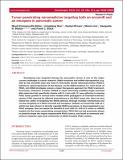Tumor penetrating nanomedicine targeting both an oncomiR and an oncogene in pancreatic cancer
Author(s)
Gilles, Maud-Emmanuelle; Hao, Liangliang; Brown, Kaelyn; Lim, Jihoon; Bhatia, Sangeeta N; Slack, Frank J.; ... Show more Show less
DownloadPublished version (4.432Mb)
Publisher with Creative Commons License
Publisher with Creative Commons License
Creative Commons Attribution
Terms of use
Metadata
Show full item recordAbstract
Developing new targeted therapy for pancreatic cancer is one of the major current challenges in cancer research. KRAS mutations and miRNA dysregulation (e.g. miR-21-5p oncomiR) play key roles in Pancreatic Ductal Adenocarcinoma (PDAC), leading to rapid progression of the disease. As the KRAS mutation is a main driver of PDAC, anti-KRAS strategies remain a major therapeutic approach for PDAC treatment. Previously, utilization of either siKRAS or small chemically modified single-stranded RNA molecules that specifically disable miR-21 (anti-miR-21) were effective in slowing PDAC tumor growth in various tumor models when packaged in an innovative delivery system (TPN) required for efficient drug delivery to the PDAC tumor site. Here we have tested the utility of targeting the KRAS pathway through multiple mechanisms and via dual targeting of a PDAC oncomiR and oncogene. Initially we found that miR-217, which has been shown to directly regulate KRAS expression, is downregulated in our PDAC samples, thus we tested the benefits of anti-miR-21, miR-217 mimic or siKRAS loaded into the tumor-penetrating nanoparticles (TPN) that we had previously shown to potently target the largely impenetrable PDAC tumors, and found an enhanced anti-tumoral response upon dual treatments in KRAS-mutated PDAC models.
Date issued
2019-09Department
Massachusetts Institute of Technology. Institute for Medical Engineering & Science; Koch Institute for Integrative Cancer Research at MITJournal
Oncotarget
Publisher
Impact Journals, LLC
Citation
Gilles, Maud-Emmanuelle et al. "Tumor penetrating nanomedicine targeting both an oncomiR and an oncogene in pancreatic cancer." Oncotarget 10, 51 (September 2019): 5349-5358 © 2019 Gilles et al.
Version: Final published version
ISSN
1949-2553